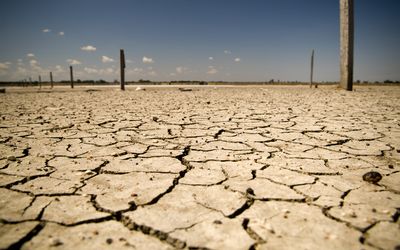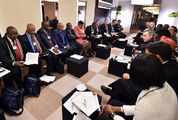Drought and poor control of boreholes add to crisis
by Graeme Hosken,
2016-02-01 05:50:49.0
A DEVASTATING drought and dwindling water resources, coupled with poor management of boreholes, threaten the country’s underground water.
Desperate farmers are drilling boreholes to extreme depths, some beyond 500m. But water and borehole experts say these depths are excessive, with the average extent varying between 60m and 150m.
African Farmers Association president Mike Mlengana said: "We have farmers drilling beyond 500m … and that is on Gauteng’s East and West Rand. They hit water, but if they are lucky it lasts two days, then it dries up. The levels being drilled are unprecedented."
Free State farmer James Tolmay said while he had a good supply of borehole water, his neighbours had big problems.
"My boreholes are 12m deep, but they are going beyond 200m. We need huge amounts of water to irrigate our crops — 20,000 litres a day — but they are struggling to get it. The boreholes are in trouble. If we don’t get good rains within the week across the country, there are going to be serious problems."
Compounding the problem is the lack of understanding around the scientific expertise needed in locating water, and the management and regulation of boreholes.
Matthys Dippenaar, a research project leader for the Water Research Commission, advised against using groundwater when surface water was threatened. He said the regulating and licensing of groundwater was poorly monitored, "with few if any databases for domestic boreholes".
There was no way of knowing how much water was being pumped out of the ground.
He said while Gauteng had higher yielding underground water sources, aquifers were localised and not consistent.
"The big issue is to try and locate them, especially in the areas where you need water."
Not enough emphasis was placed on water scarcity, and water was wasted on filling swimming pools and watering lawns.
"We may, unfortunately, only learn in years from now the true impact of the drought, with the result being shrinking underground water tables.
"The levels of borehole-drilling is making the underground water table unsustainable."
Agri-Gauteng president Frans van der Berg said there was a noticeable drop in underground water levels.
"Many farmers have had to reduce their field irrigation by 75% because there is simply no water."
He said the government had no manpower to monitor borehole drilling or its effect and when the water would run out.
Hydro-geologist Albertus Lombaard, of Aqua Earth Consulting, said the challenge was the lack of scientific evaluation. "You don’t just drill a borehole. The starting point is geology … the onus is also on the end-user to ensure they don’t overuse their borehole."
The Department of Water Affairs and Sanitation referred queries to the Environmental Affairs Department, which had not replied by the time of publication.

Picture: THINKSTOCK
A DEVASTATING drought and dwindling water resources, coupled with poor management of boreholes, threaten the country’s underground water.
Desperate farmers are drilling boreholes to extreme depths, some beyond 500m. But water and borehole experts say these depths are excessive, with the average extent varying between 60m and 150m.
African Farmers Association president Mike Mlengana said: "We have farmers drilling beyond 500m … and that is on Gauteng’s East and West Rand. They hit water, but if they are lucky it lasts two days, then it dries up. The levels being drilled are unprecedented."
Free State farmer James Tolmay said while he had a good supply of borehole water, his neighbours had big problems.
"My boreholes are 12m deep, but they are going beyond 200m. We need huge amounts of water to irrigate our crops — 20,000 litres a day — but they are struggling to get it. The boreholes are in trouble. If we don’t get good rains within the week across the country, there are going to be serious problems."
Compounding the problem is the lack of understanding around the scientific expertise needed in locating water, and the management and regulation of boreholes.
Matthys Dippenaar, a research project leader for the Water Research Commission, advised against using groundwater when surface water was threatened. He said the regulating and licensing of groundwater was poorly monitored, "with few if any databases for domestic boreholes".
There was no way of knowing how much water was being pumped out of the ground.
He said while Gauteng had higher yielding underground water sources, aquifers were localised and not consistent.
"The big issue is to try and locate them, especially in the areas where you need water."
Not enough emphasis was placed on water scarcity, and water was wasted on filling swimming pools and watering lawns.
"We may, unfortunately, only learn in years from now the true impact of the drought, with the result being shrinking underground water tables.
"The levels of borehole-drilling is making the underground water table unsustainable."
Agri-Gauteng president Frans van der Berg said there was a noticeable drop in underground water levels.
"Many farmers have had to reduce their field irrigation by 75% because there is simply no water."
He said the government had no manpower to monitor borehole drilling or its effect and when the water would run out.
Hydro-geologist Albertus Lombaard, of Aqua Earth Consulting, said the challenge was the lack of scientific evaluation. "You don’t just drill a borehole. The starting point is geology … the onus is also on the end-user to ensure they don’t overuse their borehole."
The Department of Water Affairs and Sanitation referred queries to the Environmental Affairs Department, which had not replied by the time of publication.




















Change: -1.06%
Change: -1.03%
Change: -2.10%
Change: -0.65%
Change: -1.85%
Data supplied by Profile Data
Change: -1.41%
Change: -0.10%
Change: -1.03%
Change: 0.00%
Change: -0.04%
Data supplied by Profile Data
Change: 0.88%
Change: 0.46%
Change: 1.21%
Change: 1.22%
Change: 0.11%
Data supplied by Profile Data
Change: -0.23%
Change: -0.92%
Change: -0.56%
Change: -1.10%
Change: -0.91%
Data supplied by Profile Data